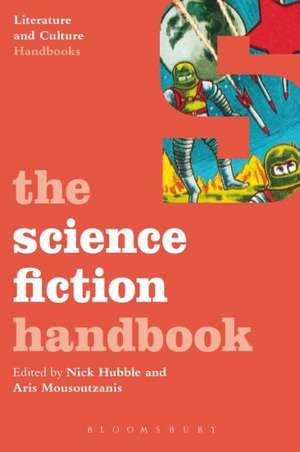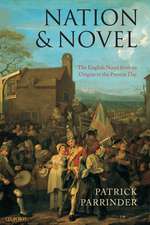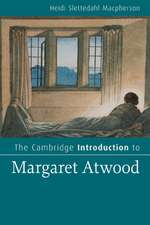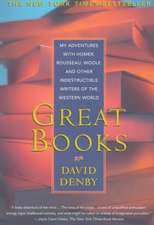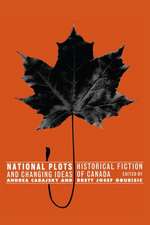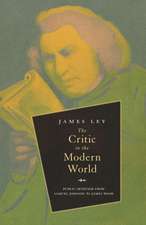The Science Fiction Handbook: Literature and Culture Handbooks
Editat de Dr Nick Hubble, Dr Aris Mousoutzanisen Limba Engleză Paperback – 20 noi 2013
| Toate formatele și edițiile | Preț | Express |
|---|---|---|
| Paperback (1) | 186.82 lei 43-57 zile | |
| Bloomsbury Publishing – 20 noi 2013 | 186.82 lei 43-57 zile | |
| Hardback (1) | 833.06 lei 43-57 zile | |
| Bloomsbury Publishing – 20 noi 2013 | 833.06 lei 43-57 zile |
Preț: 186.82 lei
Preț vechi: 228.68 lei
-18% Nou
Puncte Express: 280
Preț estimativ în valută:
35.76€ • 38.86$ • 30.06£
35.76€ • 38.86$ • 30.06£
Carte tipărită la comandă
Livrare economică 21 aprilie-05 mai
Preluare comenzi: 021 569.72.76
Specificații
ISBN-13: 9781441170965
ISBN-10: 1441170960
Pagini: 256
Dimensiuni: 156 x 234 x 13 mm
Greutate: 0.43 kg
Editura: Bloomsbury Publishing
Colecția Bloomsbury Academic
Seria Literature and Culture Handbooks
Locul publicării:London, United Kingdom
ISBN-10: 1441170960
Pagini: 256
Dimensiuni: 156 x 234 x 13 mm
Greutate: 0.43 kg
Editura: Bloomsbury Publishing
Colecția Bloomsbury Academic
Seria Literature and Culture Handbooks
Locul publicării:London, United Kingdom
Caracteristici
Case study readings, an historical timeline and A-Z entries on key writers and terms help students master the topic.
Notă biografică
Nick Hubble is Head of English Literature at Brunel University, London, UK. Aris Mousoutzanis is Lecturer in Film and Screen Studies, University of Brighton, UK.
Cuprins
AcknowledgmentsNotes on ContributorsIntroductionNick Hubble1 The Historical Context of Science Fiction Nick Hubble2 An Annotated Science Fiction TimelineJoseph Norman3 Major Science Fiction AuthorsNick Hubble, Emma Filtness and Joseph Norman4 Case Studies in Reading 1: Key Primary Literary Texts Christopher Daley5 Case Studies in Reading 2: Key Theoretical and Critical Texts in Science Fiction Studies Jessica Langer6 Key Critical Concepts, Topics and CriticsDavid M. Higgins and Roby Duncan7 The Science Fiction Film Aris Mousoutzanis8 Science Fiction Criticism Andrew M. Butler9 Changes in the Canon Adam Roberts10 Issues of Gender, Sexuality and EthnicityPat Wheeler11 Mapping the Current Critical Landscape Sherryl VintIndex 255
Recenzii
Science Fiction sets out to imagine different worlds and futures. Its own future is at every moment being changed by the real world - often painfully, but for the better. This book is a welcome, and welcoming, introduction and contribution to that uneven progress.
The book is designed to present an overview of the history of both literary SF and scholarly analysis of the same, while acknowledging the debt cinema owes to it as well. The anticipated readership is clearly those engaging at an undergraduate level in the literary analysis of the SF genre. As such, the work is written so as to be accessible to non-specialists, although serious scholars will likely find the chapters worth perusing as well.
This will be a satisfying book for teachers and students of science fiction. The nonlinear structure allows readers to select material that meets their needs, but the entire book is a worthy resource. Particularly fruitful are chapters describing changes in the canon and issues of gender, sexuality, and ethnicity; these offer theoretically oriented assessments of the growing inclusion of nonwhite male authors, characters, and perspectives in science fiction. Though scholarly in tone, this collection is clearly written and accessible to all audiences. Summing Up: Recommended. All readers.
This is a valuable new guide to an important body of literature central to our culture. It combines the functions of chronology, history and critical commentary in ways which are accessible to the reader, tracing out the origins and continuing evolution of science fiction as one of the most engaged cultural forms of our time.
Chapter by chapter, The Science Fiction Handbook builds a picture of sf's history and a critical guide to thinking about the genre. Culminating in a snapshot of where sf studies is right now, it is a really, really useful introduction to the defining literature of the 20th and 21st centuries.
This is an excellent introduction to science fiction and its key texts, authors, theories and concepts. It is the ideal companion to the study of the genre at undergraduate level and I will be recommending it to my own students. It will also be very useful for the reader or fan of science fiction who wishes to deepen their critical interest in the subject. The book is very well organised, written by some of the most incisive critics of science fiction in a scholarly but accessible style. The Handbook is organised through thematic chapters, with very clear internal structures and with excellent, up-to-date reading lists. I anticipate that the Handbook will become a go-to text for the study of science fiction at undergraduate level and beyond.
This is a very useful overview of the genre, key concepts and recent scholarship.
The book is designed to present an overview of the history of both literary SF and scholarly analysis of the same, while acknowledging the debt cinema owes to it as well. The anticipated readership is clearly those engaging at an undergraduate level in the literary analysis of the SF genre. As such, the work is written so as to be accessible to non-specialists, although serious scholars will likely find the chapters worth perusing as well.
This will be a satisfying book for teachers and students of science fiction. The nonlinear structure allows readers to select material that meets their needs, but the entire book is a worthy resource. Particularly fruitful are chapters describing changes in the canon and issues of gender, sexuality, and ethnicity; these offer theoretically oriented assessments of the growing inclusion of nonwhite male authors, characters, and perspectives in science fiction. Though scholarly in tone, this collection is clearly written and accessible to all audiences. Summing Up: Recommended. All readers.
This is a valuable new guide to an important body of literature central to our culture. It combines the functions of chronology, history and critical commentary in ways which are accessible to the reader, tracing out the origins and continuing evolution of science fiction as one of the most engaged cultural forms of our time.
Chapter by chapter, The Science Fiction Handbook builds a picture of sf's history and a critical guide to thinking about the genre. Culminating in a snapshot of where sf studies is right now, it is a really, really useful introduction to the defining literature of the 20th and 21st centuries.
This is an excellent introduction to science fiction and its key texts, authors, theories and concepts. It is the ideal companion to the study of the genre at undergraduate level and I will be recommending it to my own students. It will also be very useful for the reader or fan of science fiction who wishes to deepen their critical interest in the subject. The book is very well organised, written by some of the most incisive critics of science fiction in a scholarly but accessible style. The Handbook is organised through thematic chapters, with very clear internal structures and with excellent, up-to-date reading lists. I anticipate that the Handbook will become a go-to text for the study of science fiction at undergraduate level and beyond.
This is a very useful overview of the genre, key concepts and recent scholarship.
